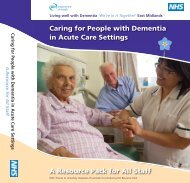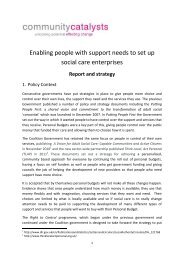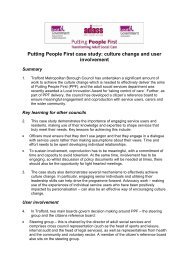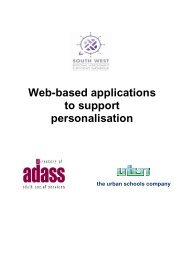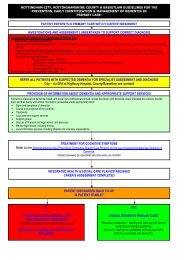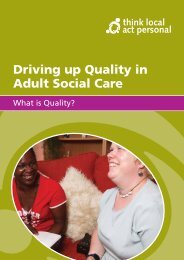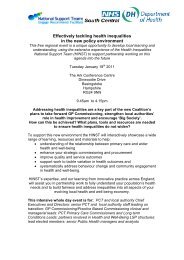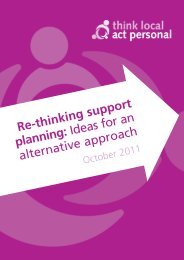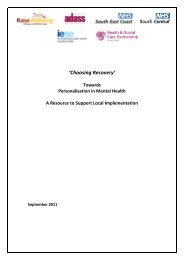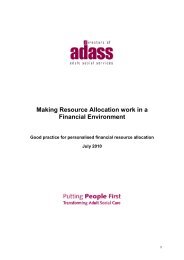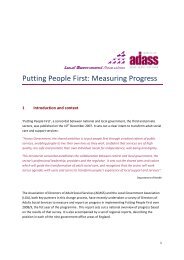Practical approaches to safeguarding and personalisation (pdf ...
Practical approaches to safeguarding and personalisation (pdf ...
Practical approaches to safeguarding and personalisation (pdf ...
You also want an ePaper? Increase the reach of your titles
YUMPU automatically turns print PDFs into web optimized ePapers that Google loves.
<strong>Practical</strong> <strong>approaches</strong> <strong>to</strong> <strong>safeguarding</strong> <strong>and</strong> <strong>personalisation</strong><br />
5. Managing the money <br />
Personal budgets are an important aspect of <strong>personalisation</strong>. It is important that in establishing<br />
a support plan consideration is given <strong>to</strong> the most suitable way that the money is managed.<br />
A personal budget describes the amount of money allocated <strong>to</strong> an individual for their assessed<br />
eligible needs. It can be given as a direct payment or managed by the council or a third party.<br />
A personal budget must be spent in line with a support plan that has been agreed by both the<br />
person <strong>and</strong> the council. A Vision for Social Care: Capable Communities <strong>and</strong> Active Citizens<br />
(HM Government 2010) encourages councils <strong>to</strong> provide the right support that makes it as easy<br />
as possible for people <strong>to</strong> receive the money as a direct payment. The Vision challenges<br />
councils <strong>to</strong> provide personal budgets, preferably as direct payments, <strong>to</strong> everyone who is<br />
eligible, within the next two years.<br />
ADASS Making progress with Putting People First 2009 describes a personal budget as:<br />
‘the term used <strong>to</strong> describe the amount of money that will fund a person’s care <strong>and</strong> support<br />
costs. It is calculated by assessing a person’s needs. It is spent in line with a support plan that<br />
has been agreed by both the person <strong>and</strong> the council. It can be either a full or a partial<br />
contribution <strong>to</strong> such costs. The person may also choose <strong>to</strong> pay for additional support on <strong>to</strong>p of<br />
the budget. So the term personal budget refers <strong>to</strong> social care money. A personal budget may<br />
be taken by an eligible person:<br />
• in the form of a direct (cash) payment, held directly by the person or where they lack<br />
capacity, by a “suitable person” (from 9 November 2009).<br />
• by way of an ‘account’ held <strong>and</strong> managed by the council in line with the person’s<br />
wishes i.e. <strong>to</strong> pay for community care services which are commissioned by the<br />
council, or as an account placed with a third party (provider) <strong>and</strong> ‘called-off’ by the<br />
user in direct negotiation with the provider<br />
• as a mixture of the above.<br />
Direct payments offer people the maximum degree of choice <strong>and</strong> control in how their eligible<br />
needs are met. Alongside good support planning, they empower people <strong>to</strong> build their own<br />
networks of support <strong>and</strong> manage their own risks. People who are connected <strong>to</strong> communities<br />
<strong>and</strong> empowered <strong>to</strong> take control of their lives are more likely <strong>to</strong> be safe from harm.<br />
The availability of good support services can make a big difference in people’s ability <strong>and</strong><br />
willingness <strong>to</strong> manage a direct payment. They can provide help with managing money, staff<br />
<strong>and</strong> services. For example:<br />
• Assisting with the advertising <strong>and</strong> recruitment process of employing a Personal<br />
Assistant.<br />
• Liaising with care agencies.<br />
29



